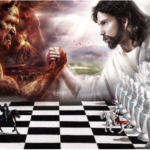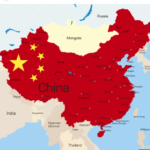These are excerpts from the article, which can be read in full at Gefira Financial Bulletin #68.
[…]
Nowadays, the situation is different: In the Euro-Asian heartland, China is making progress as a rising world power (the New Silk Road), and the world islands continue to be controlled by the former maritime powers (France controls most of the countries in West Africa and Sub-Sahara politically, economically, and through a strong military presence), half of the inhabitants of the remotest countries and islands kneel before the late Queen (no one in Central Asia, mind you), and Germany was flattened into a buffer state by the U.S., England and France after the war (especially when it comes to national identity and strength) and disempowered (their “decision makers” cannot decide whether they want to continue to act as a buffer state, a major Western country, or Russia’s stooge). Despite the new circumstances, Mackinder’s thesis remains relevant and the new/old world powers are striving for the heartland.
The “colonies” of the tsars were given the status of autonomous republics in the USSR by the Bolsheviks, which Putin always considered a mistake and questioned their autonomy. One could risk the statement that the Bolsheviks to some extent used soft power towards the autonomous republics, while Putin’s policy is always aimed at collision course towards the 21 autonomous republics: Chechnya, Ossetia, Abkhazia, Moldova are the examples. Putin wanted and wants to fix the mistake of the Bolsheviks, which after the end of the Soviet Union led to the independence of many resource-rich autonomous republics such as Kazakhstan, Azerbaijan, Turkmenistan, and to the fact that Russia can no longer be supplied with fresh blood (raw materials) from its former colonial veins. The West has failed to understand that by trying to lure Ukraine into its Anglo-Saxon, German, Polish zone of influence, it is threatening the domination of the Heartland. Hence the whole war. If Russians tried to install in Canada an autonomous, Russian republic with traditional, conservative values, a republic, let’s say, of Indians so closely related to Siberian peoples, and supplied them with tons of weapons as First Nations, what would be left of Canadian cities? Are we crazy? No! The enemy, the friends, the target can be chosen at will in today’s times. It may be paradoxical, unrealistic and unfounded, but that’s the way wars are. Once they appear, they are full of idealistic contradictions and their consequences are worse than anyone could have expected. And everyone always wonders: why such a thing in the XXI century? Well, because the human mind and geopolitical points of view do not develop as fast as, say, the electronics and entertainment industries.
[…]
Yakutia
Speaking of the “absurd” idea of Canada being occupied by Russians: Yakutia, an autonomous republic in the Soviet Union and the Russian Federation, may become the next target of the West. In an area the size of India, there lives on average one person per square kilometer. Actually, they all live in Yakutsk or in small towns, otherwise there are only deserted, frost-soaked, but resource-rich large areas. “One tells that when God created the earth, he sent an angel over Siberia with a sack full of riches. When this flew over Yakutia, his fingers became stiff with cold, and he dropped everything. All the riches, , silver and platinum fell to the earth. However, out of anger at his loss, he punished this region with eternal winter”. 1
Yakutia (number 14 on the map) – the largest of the 22 autonomous republics within the Russian Federation.
[…]

















